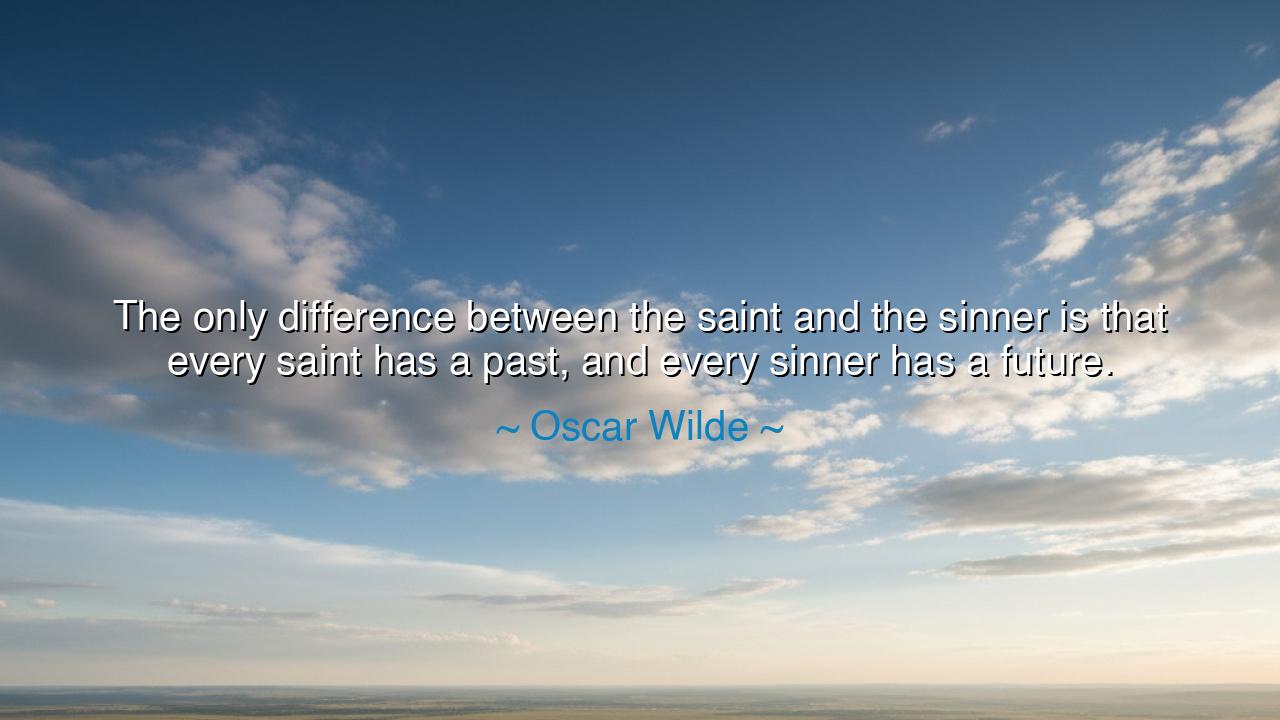
The only difference between the saint and the sinner is that
The only difference between the saint and the sinner is that every saint has a past, and every sinner has a future.






"The only difference between the saint and the sinner is that every saint has a past, and every sinner has a future." These words, spoken by the brilliant Oscar Wilde, touch upon the very essence of human nature, redemption, and the fluidity of morality. In this single, evocative line, Wilde unveils the profound truth that no individual is born purely good or evil. We are all shaped by our actions, our choices, and the paths we walk, and within each person lies the potential for both greatness and downfall. The saint, revered for their virtue and goodness, has walked a path of struggle, growth, and transformation. The sinner, though condemned for their wrongdoing, is not beyond hope, for they, too, have the ability to change and to redeem themselves.
In ancient times, the philosophers taught that virtue and vice were not fixed but fluid. Aristotle understood that the moral character of a person is not set in stone at birth but is shaped by their choices, by their actions in the world. A person is not inherently good or bad; instead, they are a product of their decisions and the journeys they undertake. The saint has, through perseverance, wisdom, and often great suffering, chosen the path of goodness, but they too were once flawed. The sinner, in their mistakes, is given the gift of redemption, for they have the future before them, a chance to learn, to grow, and to transform their path.
The story of Augustine of Hippo, one of the most revered figures in the early Christian Church, offers a powerful illustration of Wilde’s truth. Augustine’s youth was marked by wild living, vice, and immorality. He sought pleasure and worldly success, abandoning his spiritual roots for a life of indulgence. Yet, through the years, he experienced a profound conversion that led him to become one of the most significant theologians and saints in history. Augustine’s life exemplifies that the sinner has a future, a future in which they can transform themselves. His past, filled with mistakes, was not a defining feature of his identity, but merely a stepping stone in his journey toward wisdom and spiritual enlightenment.
Wilde’s words also find resonance in the life of Nelson Mandela, whose own journey moved from a young revolutionary, involved in violent resistance, to a statesman committed to reconciliation and peace. In his youth, Mandela was involved in actions that, to many, might have branded him as a sinner. However, through the course of his life, he underwent a transformation that saw him become a figure of profound moral authority, a symbol of forgiveness and peace. Mandela’s life shows that the future of a person is not dictated by their past, no matter how checkered it may be. Like Augustine, his redemption came not from hiding his past but from acknowledging it and choosing to act with righteousness.
The ancient idea of redemption is deeply rooted in the concept of the human spirit’s capacity for change. To the Buddhists, the path of suffering is not an end, but a beginning of enlightenment. The journey through samsara, the cycle of birth, life, death, and rebirth, offers countless opportunities for self-realization and spiritual awakening. The sinner, in Buddhist thought, is one who has yet to see the full potential of their actions, but they are always on the path, and in each life, there is the chance to break free from the cycle of suffering and to live a life of virtue. The saint, too, is not seen as perfect but as one who has overcome their own suffering and ignorance to achieve enlightenment.
Wilde’s wisdom here speaks not only of moral failings but of the power of transformation. It serves as a reminder that no one is permanently fixed in their faults or their virtues. Whether saint or sinner, we are all malleable, capable of change, growth, and redemption. The sinner is not defined by their past, but by the choices they make from this moment forward. The saint, too, is not defined by the perfection they have attained, but by the struggles they have endured, the mistakes they have made, and the lessons they have learned. Their sanctity is a product of the journey they have walked.
So, take this lesson into your own life, dear listener. Do not let your past define you, whether it is a past of triumph or failure. Remember that you have a future, and it is in your power to shape it with every choice you make today. If you have stumbled, do not despair, for the path to greatness lies ahead, and it is paved with the lessons of your past mistakes. If you stand in the light of virtue, remember that your journey is not yet complete, and that the road ahead will continue to demand humility and perseverance. Every saint has a past, and every sinner has a future—your story is still being written, and the choices you make today will shape the legacy of tomorrow.
Live with purpose, knowing that your past does not imprison you, and that each new day is an opportunity to act with wisdom and integrity, to choose the path of redemption and growth. The future belongs to those who have the courage to transform themselves, no matter where they have come from. Let this knowledge guide you, and may you walk forward, not in the shadow of your past, but in the light of your potential.






AAdministratorAdministrator
Welcome, honored guests. Please leave a comment, we will respond soon